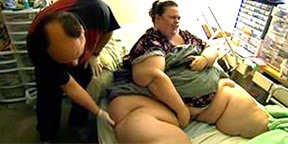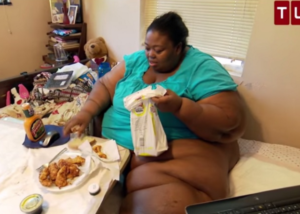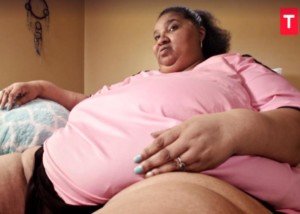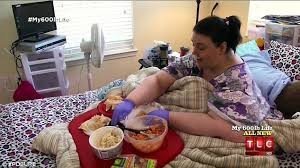
Something happened in the enabler’s childhood that makes them keep bringing food to the super morbidly obese (“My 600 Pound Life”) who can’t move much.
Many of the “600 Pound Life” subjects are actually closer to 700 pounds.
What on earth could have happened in the enabler’s childhood that drives them to keep bringing life-threatening amounts of junk food to their loved-one who can barely get out of bed—and sometimes can’t?
- How can the enabler trade their OWN life for the continuous “caregiving,” which includes gruesome tasks such as cleaning up infections beneath enormous rolls of fatty tumors?
- How are the enablers able to stomach the sights and odors that come with their role?
- This isn’t about love and devotion. Something else is going on here.
“Codependency” is the dynamic between the enabler and the 600+ pound, bedridden or severely immobilized loved-one.
The Enabler’s Childhood
“The characteristics of codependency invariably originate in childhood,” begins Linda Centeno, PhD, clinical psychologist, and assistant director of the Koch Center in NJ that specializes in eating disorder treatment.
“Many codependent individuals [the enablers] have had to endure difficult family dynamics in their families of origin and have had to develop ways of coping to survive,” continues Centeno.
“Children who come from chaotic families often feel worried and scared. They feel that things are unsafe and often try to make themselves feel better by focusing on controlling others’ behavior in an attempt to ‘keep the peace.’
“When children grow up this way, they learn not to think of themselves and what they may need, but how to appease and take care of others.”
If you’re a regular viewer of “My 600 Pound Life,” you’ve probably seen the episode where the husband routinely trekked a considerable distance by foot to the grocery store to shop for his immobilized wife, lugging back large quantities of food across a big field of grass.
You’ve seen Dillon, young adult son of Pauline, leading a life completely absent of friendships and hobbies, because all of his time was focused on enabling his mother.
Though offspring of the super morbidly obese grew up in their enabling role, what about people who became enablers only after they reached adulthood?
As Dr. Centeno explains, the child in a chaotic family environment never learns to focus on himself or herself.
You’ll note that in “My 600 Pound Life,” the enabler is rarely, if ever, a professional with some outside hobby like golf, hiking, karate or volunteer activities.
The learned dynamic “makes it difficult for the person to know who they are as a person separate from the one they are trying to help,” says Dr. Centeno.
“It is safer psychologically to stay attached and needed than to individuate and become a separate person in their own right.” Penny’s husband Edgar comes to mind.
“The result is that they become enmeshed, do not feel a separate sense of autonomy, and know no way to be without the person they are trying to take care of. In fact, the idea of standing alone can feel tantamount to death.”
This is why the enabler, though knowing that a heart attack can be one meal away, continues feeding their loved-one dangerous amounts of unhealthy food.
Enablers Can’t Say “No!” out of Love
How many times, on “My 600 Pound Life,” have you heard the enabler say they can’t say “No!” to all the food demands because of their “love” for that person?
You’ve heard, “How can I say ‘No’ to my daughter,” and, “How do I say ‘No’ to the man I love?”
Explains Dr. Centeno, “In the case of a relationship with a morbidly obese individual, many caregivers do not even realize that they are codependent. These dynamics are unconscious.
“The person feels that this is the way they have to be, and can even take a certain amount of pride (and security) in feeling that they are doing a good job; that they are devoted, loving and responsible.
“It is the source of the positive feelings they have about themselves and it is nearly impossible to imagine themselves separate from the dynamics of the relationship.
“If the person is focused on the caregiving aspects of their loved-one’s extensive needs, then there are no autonomous decisions to be made, no time to look at their own conflictual feelings, such as anger, resentment or emptiness.
“The caregiver feels so needed and indispensable and their own self-worth is so wrapped up in having to take care of the other, that it actually saves the caregiver from the daunting task of having to find their own purpose as a separate individual.”
This sounds so much like Pauline’s son, Dillon, but also many of the people who became enablers after they reached adulthood.
“Many caregivers worry that without the other, they would have no purpose.”
Dr. Centeno adds, “Unconsciously, a caregiver may worry that the partner may leave him or her and then the caregiver would be forced to be separate and autonomous (and alone).
“The person who is in love with the morbidly obese individual is hungry to be loved and needed by them.
“However, the morbidly obese person is addicted to food and has replaced the love for their partner with love for food.
“Essentially, this dynamic leaves the caregiver with many unmet needs. But the feeling of being needed by their partner is often more powerful than the fear of being alone.”
Not everyone will turn out to be an enabler to a 600 pound individual—regardless of how chaotic their childhood is — simply because not everyone’s brain is innately hardwired the same way.
In short, enabling is NOT something that can happen to anybody.

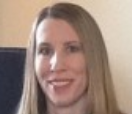 Dr. Centeno
Dr. Centeno